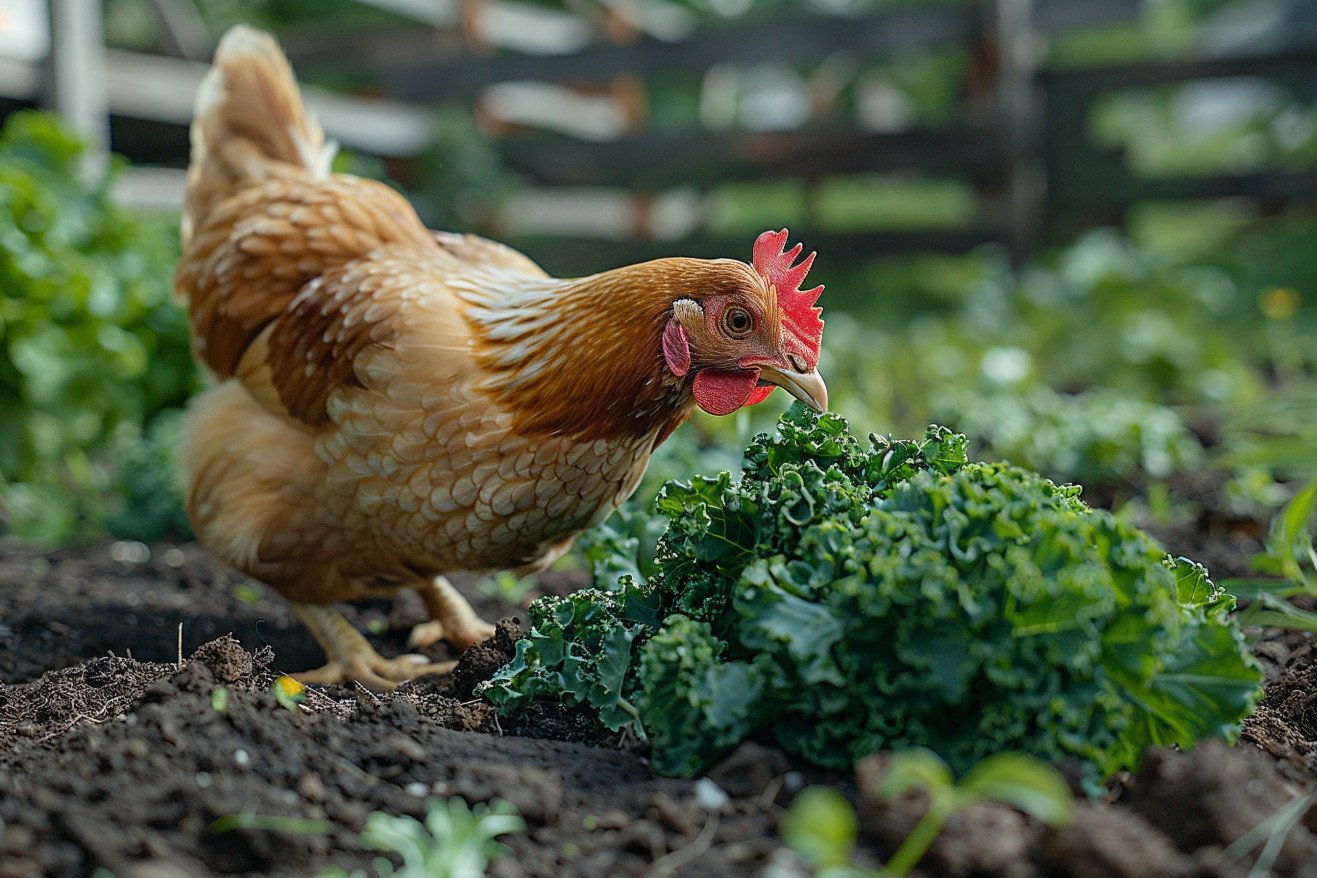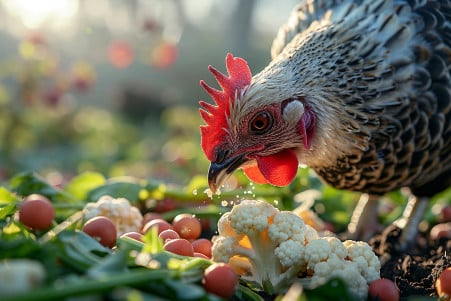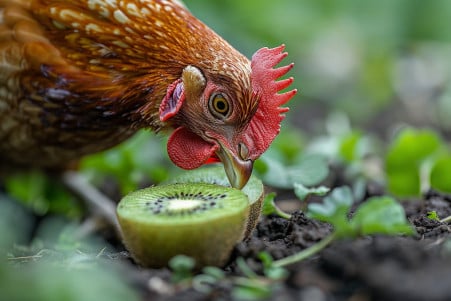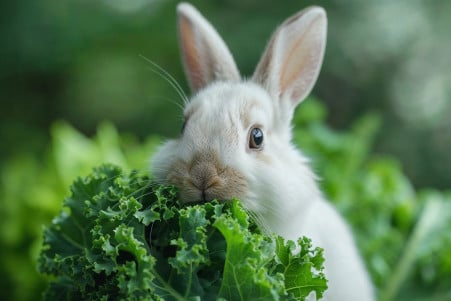Can Chickens Eat Kale? Nutritional Benefits & Feeding Tips
6 March 2024 • Updated 6 March 2024

Kale is a nutritional powerhouse, and it turns out that it may be just as good for your chickens as it is for you. Chickens can eat kale as part of a well-rounded diet.
Kale is full of vitamins A and C, calcium, and omega-3 fatty acids, all of which can help support your chickens’ immune systems and overall health. You can feed your chickens kale two to three times a week, making sure to chop it up and never let it make up more than 10% of their diet.
This article will review agricultural research, veterinary nutrition studies, and practical advice for chicken keepers. It will cover the many ways that kale can be good for chickens and the potential downsides of adding it to their diet. It will also discuss where kale falls in the larger context of chicken nutrition, so you can be sure you have all the information you need to decide whether or not to feed your chickens kale.
Can chickens eat kale?
Nutritional Powerhouse: How Kale Benefits Poultry
Kale is a nutritional powerhouse for chickens due to its high levels of vitamins, minerals, and antioxidants. According to BackYard Chickens, kale is a great source of vitamins A, C, and K, which are important for eye health, immune health, and bone health, respectively. It also contains high levels of calcium, phosphorus, magnesium, and potassium, which are important for cellular health and bone health.
The antioxidants in kale, including beta-carotene, flavonoids, and polyphenols, are important for fighting oxidative stress, which can cause damage to cells and tissues. The Happy Chicken Coop notes that these antioxidants, which are also important for human health, are important for chickens as well because they help with tissue growth and reduce inflammation.
According to Chickens and You, a study published in the Korean Journal for Food Science of Animal Resources found that the carotenoids in kale can improve egg production and yolk color, which means that it can impact reproductive health. In addition, the fiber in kale can help with digestion and gut health, which means that it can help ensure that chickens have a healthy gastrointestinal system.
Kale has a more nutrient-dense profile than many other leafy greens that are commonly fed to chickens. As a result, it should be part of a well-rounded diet that includes a variety of vegetables to ensure that chickens get all of the nutrients that they need and stay healthy.
Mindful Feeding: How to Feed Your Chickens Kale
Feeding your chickens kale can be a great way to boost their overall health, but it’s important to do it in a way that’s safe and healthy for your flock. To avoid any potential issues, make sure to start with a small amount of kale and cut it into small pieces to avoid choking, according to The Happy Chicken Coop.
Also, make sure to wash the kale thoroughly to remove any dirt and pesticides that could be harmful to your chickens.
How you serve the kale is also important. For example, Chickens and You recommends mixing the kale with your chickens’ regular feed or hanging it in the coop to encourage natural pecking and foraging behaviors.
However, it’s important to be aware of the potential downsides, which include the fact that overfeeding can change the taste of the eggs and cause digestive issues. In addition, The Happy Chicken Coop notes that the oxalic acid in kale can lead to kidney problems if it’s consumed in large amounts.
To avoid these issues, it’s important to take a balanced approach and aim to feed your chickens kale 2–3 times a week, making sure that it makes up no more than 10% of their overall diet, according to BackYard Chickens. This will help you avoid any nutritional imbalances and keep your chickens healthy and happy.
By following these suggestions, you can make sure your chickens get all the benefits of kale while still maintaining a diet that’s healthy for their digestive systems.
How Kale Affects Chicken Digestive Health
One of the most important things to consider when adding kale to a chicken’s diet is how it will affect their digestive health. On one hand, the many nutrients in kale could help improve the gut microbiome, leading to a healthier digestive tract.
On the other hand, kale, like all plant matter, contains non-starch polysaccharides (NSPs). According to the University of Kentucky, NSPs are part of a group known as anti-nutritional factors, which can reduce nutrient absorption and feed efficiency.
A study in Poultry Science found that while some NSPs can help improve gut bacteria, others can increase gut viscosity, which could lead to reduced nutrient absorption.
When it comes to kale, it’s important to make sure that it’s being added to a diet in a way that will help the bird’s digestive system and nutrient absorption. For example, a study of dried cabbage leaf residues, which are closely related to kale, found that there were no negative effects on broiler performance and that nutrient digestibility was improved when the residues were added to the diet in certain amounts.
This suggests that when added in the right amounts, kale can be a healthy part of a chicken’s diet, especially when it’s used in conjunction with other feed and may even help prevent digestive issues. Making sure that a chicken’s diet is diverse will help ensure that their digestive system is healthy and that they’re getting all the nutrients they need.
Kale in the Chicken Coop: A Nutritional Comparison
Chickens need a diet that includes grains, seeds, bugs, and a variety of leafy greens to best replicate what they would eat in the wild.
According to the Open Sanctuary Project, leafy greens are an important part of a chicken’s diet, providing essential nutrients like Vitamin E, Riboflavin, Vitamin A, and Calcium, which are important for the immune system and overall health. Kale is a great fit for this reason, as it is packed with nutrients that can provide chickens with vitamins, antioxidants, and fiber.
That said, it’s important to remember that chickens need a balanced diet that includes a variety of foods. A-Z Animals explains that while leafy greens like kale can be a great addition to a chicken’s diet, they should make up no more than 20% of a chicken’s diet to ensure that they get enough protein from other sources.
While kale is high in vitamins and minerals, it should be fed in conjunction with other leafy greens like lettuce and chard to ensure that the egg yolks are a deep, rich color, according to Munson Lakes Nutrition.
Farmers also need to be aware of the oxalates in kale, which can be toxic in high amounts, and make sure that it’s balanced with other foods. In some areas, tropical greens may be more readily available and can provide similar benefits. That said, including kale in a balanced diet ensures that chickens get all the nutrients that they need, and can help ensure that they are healthy and productive.
Impact of Kale on Egg Production and Quality
Kale’s impact on chickens goes beyond their health and well-being to the eggs that we eat. Hwan-Ku Kang’s research found that the addition of dried kale to a laying hen’s diet improved the color of the egg yolk, making it more vibrant. Meanwhile, Hwan-Ku Kang’s 2008 study on the impact of dietary kale on egg-laying performance found no significant difference in egg production, feed intake, or egg mass when compared to a control group.
In addition to the color, the addition of kale to the diet also showed promise in increasing the vitamin and polyunsaturated fatty acid concentrations in eggs, although these increases were not significantly different from the control. This indicates that while kale can impact the nutritional value of eggs, the impact is likely modest when it comes to vitamins and fatty acids.
The taste of eggs from chickens that have been fed kale is largely unaffected, as there is no evidence to suggest any difference in flavor. This means that consumers can enjoy eggs that may be more nutritious without any impact on the taste.
When you consider the role of kale in poultry farming, it’s clear that its addition is more than just a supplement; it’s a move toward nutritionally enhanced eggs without any impact on production.
Feeding Kale to Chickens: A Healthy Middle Ground
So, in the end, kale is a nutrient-rich vegetable that can be fed to chickens in moderation. The high levels of vitamins A and C, calcium, and omega-3 fatty acids can help boost immunity and overall health in chickens.
However, as with anything that’s added to a diet, it’s important to make sure that you’re feeding it in a responsible way. This means that you should introduce it slowly, make sure it’s clean and cut up, and only feed it in small amounts to avoid the potential downsides of overconsumption, like digestive issues and nutrient imbalances.
That said, it’s also important to remember that variety is key. A well-balanced diet that includes a variety of leafy greens and other feed ingredients is important for the health of your flock. By feeding kale in addition to other healthy foods, you can help ensure that your chickens are healthy and productive without negatively impacting the quality of their eggs.
In the end, by responsibly and knowledgeably feeding kale to your chickens, you can help ensure that they’re happy and healthy and that they produce high-quality eggs. As you continue to care for your flock, use the information and recommendations in this article to guide your decisions and make sure that you’re providing a rich and varied diet for your birds.


